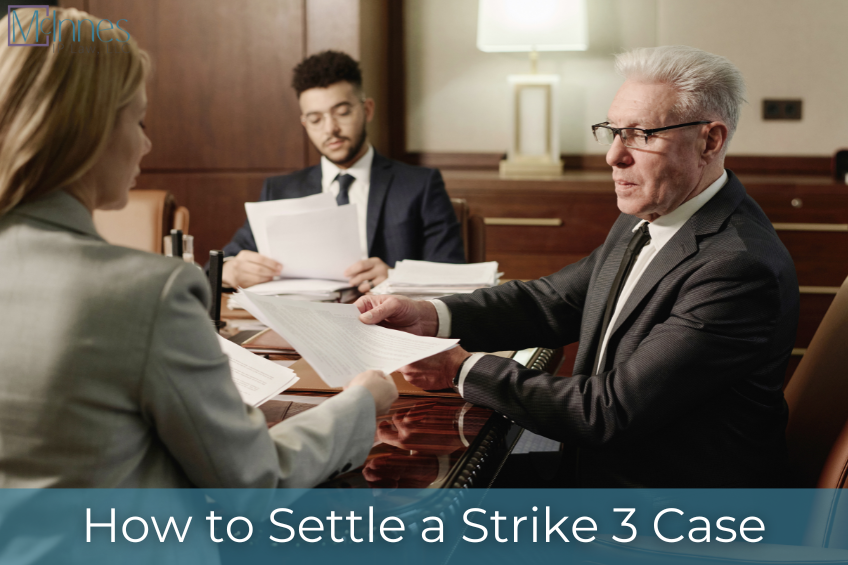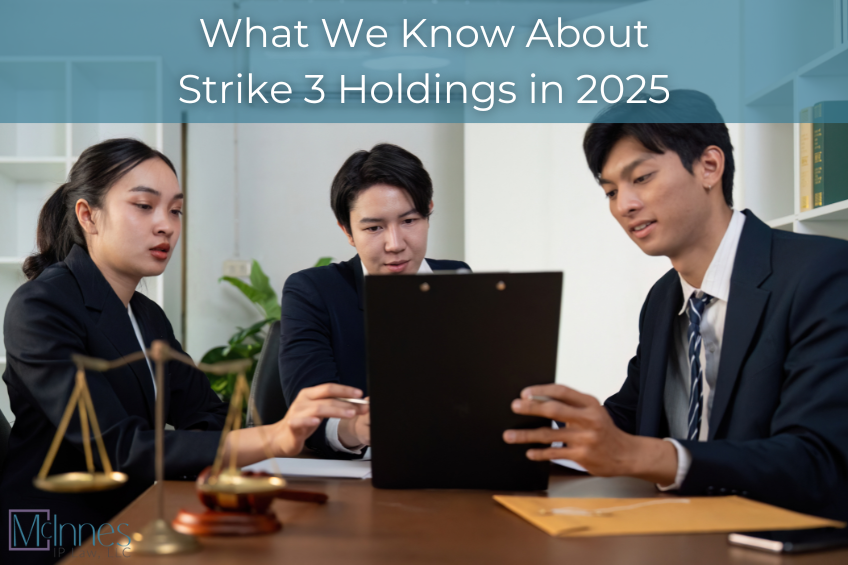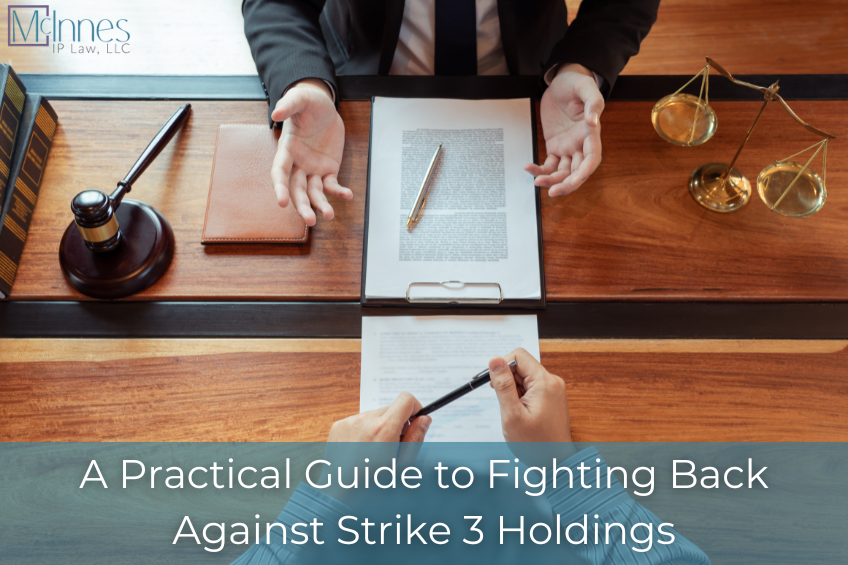If you’ve received a subpoena or legal notice from Strike 3 Holdings, you’re likely researching online and trying to figure out your next steps. Strike 3 Holdings is known for aggressively pursuing copyright infringement lawsuits related to adult content shared through BitTorrent networks. These cases often start with a John Doe lawsuit filed against an IP address, not an individual, giving you a small window of time to act before your identity is revealed.
Many recipients of these notices are not hardened pirates—they’re everyday people who may not have even been aware of the alleged infringement. If you find yourself in this situation, you’re not alone. One of the most common and effective strategies for resolving a Strike 3 case is negotiating a settlement. This blog will walk you through what settling with Strike 3 Holdings means, why it might be your best option, and how to do it the right way.
What We’ll Cover:
- Why Strike 3 cases end in settlements
- Our 4-step guide to settling with Strike 3 Holdings
- Top 3 benefits of settling a Strike 3 lawsuit
- Key takeaways
- Legal representation
Why Strike 3 Cases Are Often Settled
Strike 3 Holdings files thousands of lawsuits each year, and most are resolved through settlements. This process happens because trials are expensive, time-consuming, and carry unpredictable outcomes. For many defendants, settling is the fastest, least expensive, and most discreet path forward.
Settling with Strike 3 Holdings typically involves:
- Avoiding a public trial and the potential embarrassment that comes with it.
- Resolving the matter without admitting guilt.
- Securing a confidentiality agreement to keep your name out of public court records.
- Reducing the risk of a costly judgment against you.
- Receiving a full release so the matter never needs to be addressed ever again.
Our 4-Step Guide to Settling with Strike 3 Holdings
Settling with Strike 3 is a structured process that requires timing, strategy, and a clear understanding of your legal position. Whether your goal is to stay anonymous, avoid a costly judgment, or simply put the matter behind you, following the right steps can make all the difference. Below is our straightforward, four-step guide to navigating a Strike 3 settlement efficiently, privately, and with as little stress as possible.
1) Understanding Your Case
Before entering negotiations, it’s important to assess the strength of the case against you. This procedure involves examining the evidence Strike 3 has provided—typically your IP address and alleged dates of infringement. A qualified attorney can evaluate whether Strike 3’s claims have legal merit or if there are grounds to challenge their evidence.
2) Responding to the Subpoena
Once you receive a notice from your ISP, the clock starts ticking. You typically have a few weeks to respond before your ISP is forced to disclose your identity. During this period, an attorney may file a motion to quash or modify the subpoena, especially if there are privacy concerns or issues with the validity of the claim.
3) Initiating Settlement Talks
If you choose to settle, your attorney will open a line of communication with Strike 3’s legal team. The initial settlement demand is often high—sometimes tens of thousands of dollars—but this number is almost always negotiable.
A good attorney will:
- Push for a significantly reduced settlement amount, all while keeping your identity out of the public record.
- Ensure the agreement includes confidentiality clauses.
- Make sure you are not admitting liability.
- Protect you from further claims based on the same alleged conduct.
- Obtain a full release of all alleged claims.
4) Finalizing the Agreement
Once both sides agree to the terms, the attorney will ensure everything is properly documented. The case is then voluntarily dismissed by Strike 3 Holdings, and you are no longer at legal risk. Importantly, your name may never be publicly associated with the lawsuit if the settlement occurs before your identity is disclosed.
Do You Need Legal Representation Against Strike 3 Holdings?
3 Key Benefits of Settling with Strike 3 Holdings
Settling with Strike 3 isn’t as simple as just ending the case. A good Strike 3 attorney can offer practical advantages that protect your privacy, finances, and peace of mind. Here are the three biggest benefits defendants typically experience when choosing a well-negotiated settlement:
1) Confidentiality
Privacy is a major concern in these cases, given the sensitive nature of the content involved. Confidential settlements ensure your name stays out of public court records to help preserve your reputation.
2) Financial Control
Settling can save you from the unpredictability of the court. You’ll know upfront what you’re paying and can often avoid expensive legal proceedings. At McInnes IP Law, we take Strike 3 lawsuits on a flat fee basis of $2,000—No more, no less.
3) Peace of Mind
Quick resolution means you can move forward without months of stress and uncertainty hanging over you. You won’t need to worry about additional threatening letters or a breach of your privacy.
Key Takeaways
- Trying to Settle Without Legal Help: Attempting to negotiate on your own can lead to unfavorable terms or even trigger a more aggressive response from Strike 3. We advise against contacting Strike 3 directly.
- Ignoring the Subpoena: If you don’t respond in time, your ISP may be forced to reveal your identity, increasing your risk and reducing your leverage. We do NOT recommend ignoring any legal notice!
- Agreeing to a Bad Deal: Without experienced counsel, you may agree to a settlement that is too high, lacks confidentiality, or includes risky language.
How McInnes IP Law Can Help
At McInnes IP Law, we’ve successfully settled many Strike 3 cases across the U.S. Our experienced attorneys will be able to help you:
- Understand Strike 3’s tactics and how to counter them.
- Act quickly to protect your identity.
- Negotiate a lower settlement.
Reach out to McInnes IP Law today to schedule your free consultation. Knowledge is power, and you have nothing to lose by calling us at (774) 234-1256, emailing us at info@mcinnesiplaw.com, or messaging us on our LinkedIn Company Page.
Disclaimer: This blog is for informational purposes only and does not constitute legal advice. Every case is different. For specific guidance, consult an attorney experienced in copyright law.



